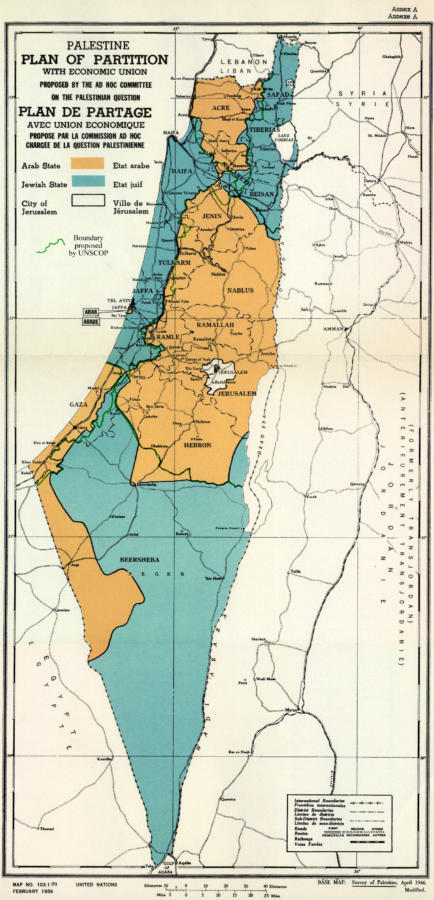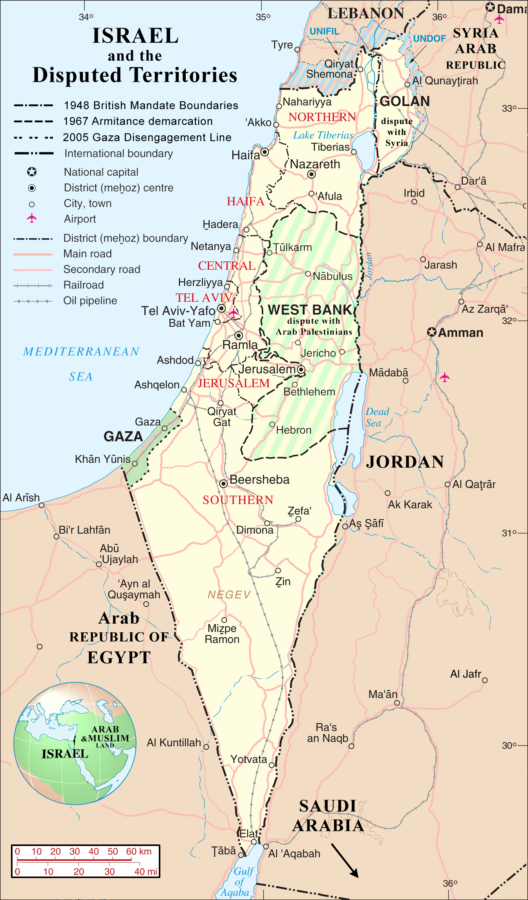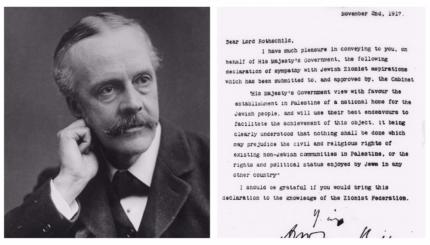On November 29, 1947, the United Nations approved a plan to separate the British Mandate territory of Palestine into two states, one Jewish and one Arab. As part of this plan, Jerusalem would have been under international control. United Nations Partition Plan for Palestine or United Nations General Assembly Resolution 181 was not successful in creating two states; the Arab world strongly rejected it, and fighting between Jews and Arabs began almost immediately after the resolution’s passage. However, the borders it laid out have been critical to subsequent negotiations. Below are excerpts from the Partition Plan.
United Nations Partition Plan
The General Assembly, Having met in special session at the request of the mandatory Power to constitute and instruct a Special Committee to prepare for the consideration of the question of the future Government of Palestine at the second regular session;
Having constituted a Special Committee and instructed it to investigate all questions and issues relevant to the problem of Palestine, and to prepare proposals for the solution of the problem, and
Having received and examined the report of the Special Committee (document A/364) including a number of unanimous recommendations and a plan of partition with economic union approved by the majority of the Special Committee,

Help us keep Jewish knowledge accessible to millions of people around the world.
Your donation to My Jewish Learning fuels endless journeys of Jewish discovery. With your help, My Jewish Learning can continue to provide nonstop opportunities for learning, connection and growth.
Considers that the present situation in Palestine is one which is likely to impair the general welfare and friendly relations among nations;
Takes note of the declaration by the mandatory Power that it plans to complete its evacuation of Palestine by l August 1948;
Recommends to the United Kingdom, as the mandatory Power for Palestine, and to all other Members of the United Nations the adoption and implementation, with regard to the future Government of Palestine, of the Plan of Partition with Economic Union set out below;

PLAN OF PARTITION WITH ECONOMIC UNION
Part I. – Future Constitution and Government of Palestine
A. TERMINATION OF MANDATE, PARTITION AND INDEPENDENCE
The Mandate for Palestine shall terminate as soon as possible but in any case not later than 1 August 1948.
The armed forces of the mandatory Power shall be progressively withdrawn from Palestine, the withdrawal to be completed as soon as possible but in any case not later than 1 August 1948.
The mandatory Power shall advise the Commission, as far in advance as possible, of its intention to terminate the mandate and to evacuate each area. The mandatory Power shall use its best endeavours to ensure that an area situated in the territory of the Jewish State, including a seaport and hinterland adequate to provide facilities for a substantial immigration, shall be evacuated at the earliest possible date and in any event not later than 1 February 1948.
Independent Arab and Jewish States and the Special International Regime for the City of Jerusalem, set forth in Part III of this Plan, shall come into existence in Palestine two months after the evacuation of the armed forces of the mandatory Power has been completed but in any case not later than 1 October 1948. The boundaries of the Arab State, the Jewish State, and the City of Jerusalem shall be as described in Parts II and III below.
The period between the adoption by the General Assembly of its recommendation on the question of Palestine and the establishment of the independence of the Arab and Jewish States shall be a transitional period.
The Provisional Council of Government of each State, acting under the Commission, shall progressively receive from the Commission full responsibility for the administration of that State in the period between the termination of the Mandate and the establishment of the State’s independence.
The Commission shall instruct the Provisional Councils of Government of both the Arab and Jewish States, after their formation, to proceed to the establishment of administrative organs of government, central and local.
The Provisional Council of Government of each State shall, within the shortest time possible, recruit an armed militia from the residents of that State, sufficient in number to maintain internal order and to prevent frontier clashes.
This armed militia in each State shall, for operational purposes, be under the command of Jewish or Arab officers resident in that State, but general political and military control, including the choice of the militia’s High Command, shall be exercised by the Commission.
The Provisional Council of Government of each State shall, not later than two months after the withdrawal of the armed forces of the mandatory Power, hold elections to the Constituent Assembly which shall be conducted on democratic lines.
The election regulations in each State shall be drawn up by the Provisional Council of Government and approved by the Commission. Qualified voters for each State for this election shall be persons over eighteen years of age who are (a) Palestinian citizens residing in that State; and (b) Arabs and Jews residing in the State, although not Palestinian citizens, who, before voting, have signed a notice of intention to become citizens of such State.
Arabs and Jews residing in the City of Jerusalem who have signed a notice of intention to become citizens, the Arabs of the Arab State and the Jews of the Jewish State, shall be entitled to vote in the Arab and Jewish States respectively.
Women may vote and be elected to the Constituent Assemblies.
During the transitional period no Jew shall be permitted to establish residence in the area of the proposed Arab State, and no Arab shall be permitted to establish residence in the area of the proposed Jewish State, except by special leave of the Commission.
The Constituent Assembly of each State shall draft a democratic constitution for its State and choose a provisional government to succeed the Provisional Council of Government appointed by the Commission. The Constitutions of the States shall embody Chapters 1 and 2 of the Declaration provided for in section C below and include, inter alia, provisions for:
Establishing in each State a legislative body elected by universal suffrage and by secret ballot on the basis of proportional representation, and an executive body responsible to the legislature;
Chapter 1: Holy Places, Religious Buildings and Sites

Existing rights in respect of Holy Places and religious buildings or sites shall not be denied or impaired.
In so far as Holy Places are concerned, the liberty of access, visit, and transit shall be guaranteed, in conformity with existing rights, to all residents and citizen of the other State and of the City of Jerusalem, as well as to aliens, without distinction as to nationality, subject to requirements of national security, public order and decorum.
Similarly, freedom of worship shall be guaranteed in conformity with existing rights, subject to the maintenance of public order and decorum.
Holy Places and religious buildings or sites shall be preserved. No act shall be permitted which may in an way impair their sacred character. If at any time it appears to the Government that any particular Holy Place, religious, building or site is in need of urgent repair, the Government may call upon the community or communities concerned to carry out such repair. The Government may carry it out itself at the expense of the community or community concerned if no action is taken within a reasonable time.
No taxation shall be levied in respect of any Holy Place, religious building or site which was exempt from taxation on the date of the creation of the State.
No change in the incidence of such taxation shall be made which would either discriminate between the owners or occupiers of Holy Places, religious buildings or sites, or would place such owners or occupiers in a position less favourable in relation to the general incidence of taxation than existed at the time of the adoption of the Assembly’s recommendations.
The Governor of the City of Jerusalem shall have the right to determine whether the provisions of the Constitution of the State in relation to Holy Places, religious buildings and sites within the borders of the State and the religious rights appertaining thereto, are being properly applied and respected, and to make decisions on the basis of existing rights in cases of disputes which may arise between the different religious communities or the rites of a religious community with respect to such places, buildings and sites. He shall receive full co-operation and such privileges and immunities as are necessary for the exercise of his functions in the State.
Chapter 2: Religious and Minority Rights
Freedom of conscience and the free exercise of all forms of worship, subject only to the maintenance of public order and morals, shall be ensured to all.
No discrimination of any kind shall be made between the inhabitants on the ground of race, religion, language or sex.
All persons within the jurisdiction of the State shall be entitled to equal protection of the laws.
The family law and personal status of the various minorities and their religious interests, including endowments, shall be respected.
Except as may be required for the maintenance of public order and good government, no measure shall be taken to obstruct or interfere with the enterprise of religious or charitable bodies of all faiths or to discriminate against any representative or member of these bodies on the ground of his religion or nationality.
The State shall ensure adequate primary and secondary education for the Arab and Jewish minority, respectively, in its own language and its cultural traditions.
The right of each community to maintain its own schools for the education of its own members in its own language, while conforming to such educational requirements of a general nature as the State may impose, shall not be denied or impaired. Foreign educational establishments shall continue their activity on the basis of their existing rights.
No restriction shall be imposed on the free use by any citizen of the State of any language in private intercourse, in commerce, in religion, in the Press or in publications of any kind, or at public meetings.
No expropriation of land owned by an Arab in the Jewish State (by a Jew in the Arab State) shall be allowed except for public purposes. In all cases of expropriation full compensation as fixed by the Supreme Court shall be said previous to dispossession.
Chapter 3: Citizenship, International Conventions and Financial Obligations
1. Citizenship Palestinian citizens residing in Palestine outside the City of Jerusalem, as well as Arabs and Jews who, not holding Palestinian citizenship, reside in Palestine outside the City of Jerusalem shall, upon the recognition of independence, become citizens of the State in which they are resident and enjoy full civil and political rights. Persons over the age of eighteen years may opt, within one year from the date of recognition of independence of the State in which they reside, for citizenship of the other State, providing that no Arab residing in the area of the proposed Arab State shall have the right to opt for citizenship in the proposed Jewish State and no Jew residing in the proposed Jewish State shall have the right to opt for citizenship in the proposed Arab State. The exercise of this right of option will be taken to include the wives and children under eighteen years of age of persons so opting.
Arabs residing in the area of the proposed Jewish State and Jews residing in the area of the proposed Arab State who have signed a notice of intention to opt for citizenship of the other State shall be eligible to vote in the elections to the Constituent Assembly of that State, but not in the elections to the Constituent Assembly of the State in which they reside.
B. THE JEWISH STATE
The north-eastern sector of the Jewish State (Eastern Galilee) is bounded on the north and west by the Lebanese frontier and on the east by the frontiers of Syria and Trans-jordan. It includes the whole of the Huleh Basin, Lake Tiberias, the whole of the Beisan Sub-District, the boundary line being extended to the crest of the Gilboa mountains and the Wadi Malih. From there the Jewish State extends north-west, following the boundary described in respect of the Arab State. The Jewish section of the coastal plain extends from a point between Minat El-Qila and Nabi Yunis in the Gaza Sub-District and includes the towns of Haifa and Tel-Aviv, leaving Jaffa as an enclave of the Arab State. The eastern frontier of the Jewish State follows the boundary described in respect of the Arab State.
The Beersheba area comprises the whole of the Beersheba Sub-District, including the Negeb and the eastern part of the Gaza Sub-District, but excluding the town of Beersheba and those areas described in respect of the Arab State. It includes also a strip of land along the Dead Sea stretching from the Beersheba-Hebron Sub-District boundary line to ‘Ein Geddi, as described in respect of the Arab State.
Part III. – City of Jerusalem
A. SPECIAL REGIME
The City of Jerusalem shall be established as a corpus separatum under a special international regime and shall be administered by the United Nations. The Trusteeship Council shall be designated to discharge the responsibilities of the Administering Authority on behalf of the United Nations.
B. BOUNDARIES OF THE CITY
The City of Jerusalem shall include the present municipality of Jerusalem plus the surrounding villages and towns, the most eastern of which shall be Abu Dis; the most southern, Bethlehem; the most western, ‘Ein Karim (including also the built-up area of Motsa); and the most northern Shu’fat, as indicated on the attached sketch-map (annex B).
C. STATUTE OF THE CITY
The Trusteeship Council shall, within five months of the approval of the present plan, elaborate and approve a detailed statute of the City which shall contain, inter alia, the substance of the following provisions:
Government machinery; special objectives. The Administering Authority in discharging its administrative obligations shall pursue the following special objectives:
To protect and to preserve the unique spiritual and religious interests located in the city of the three great monotheistic faiths throughout the world, Christian, Jewish and Moslem; to this end to ensure that order and peace, and especially religious peace, reign in Jerusalem;
To foster cooperation among all the inhabitants of the city in their own interests as well as in order to encourage and support the peaceful development of the mutual relations between the two Palestinian peoples throughout the Holy Land; to promote the security, well-being and any constructive measures of development of the residents having regard to the special circumstances and customs of the various peoples and communities.
Governor and Administrative staff. A Governor of the City of Jerusalem shall be appointed by the Trusteeship Council and shall be responsible to it. He shall be selected on the basis of special qualifications and without regard to nationality. He shall not, however, be a citizen of either State in Palestine.
The Governor shall represent the United Nations in the City and shall exercise on their behalf all powers of administration, including the conduct of external affairs. He shall be assisted by an administrative staff classed as international officers in the meaning of Article 100 of the Charter and chosen whenever practicable from the residents of the city and of the rest of Palestine on a non-discriminatory basis. A detailed plan for the organization of the administration of the city shall be submitted by the Governor to the Trusteeship Council and duly approved by it.
3. Local autonomy
The existing local autonomous units in the territory of the city (villages, townships and municipalities) shall enjoy wide powers of local government and administration.
The Governor shall study and submit for the consideration and decision of the Trusteeship Council a plan for the establishment of special town units consisting, respectively, of the Jewish and Arab sections of new Jerusalem. The new town units shall continue to form part the present municipality of Jerusalem.
Adopted at the 128th plenary meeting:
In favour: 33
Australia, Belgium, Bolivia, Brazil, Byelorussian S.S.R., Canada, Costa Rica, Czechoslovakia, Denmark, Dominican Republic, Ecuador, France, Guatemala, Haiti, Iceland, Liberia, Luxemburg, Netherlands, New Zealand, Nicaragua, Norway, Panama, Paraguay, Peru, Philippines, Poland, Sweden, Ukrainian S.S.R., Union of South Africa, U.S.A., U.S.S.R., Uruguay, Venezuela.
Against: 13
Afghanistan, Cuba, Egypt, Greece, India, Iran, Iraq, Lebanon, Pakistan, Saudi Arabia, Syria, Turkey, Yemen.
Abstained: 10
Argentina, Chile, China, Colombia, El Salvador, Ethiopia, Honduras, Mexico, United Kingdom, Yugoslavia.




